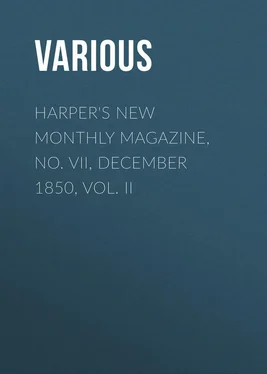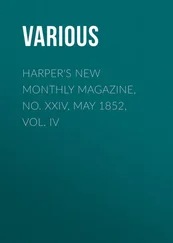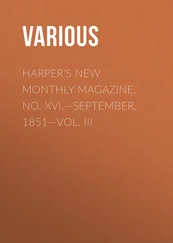Various - Harper's New Monthly Magazine, No. VII, December 1850, Vol. II
Здесь есть возможность читать онлайн «Various - Harper's New Monthly Magazine, No. VII, December 1850, Vol. II» — ознакомительный отрывок электронной книги совершенно бесплатно, а после прочтения отрывка купить полную версию. В некоторых случаях можно слушать аудио, скачать через торрент в формате fb2 и присутствует краткое содержание. Издательство: Иностранный паблик, Жанр: periodic, foreign_edu, на английском языке. Описание произведения, (предисловие) а так же отзывы посетителей доступны на портале библиотеки ЛибКат.
- Название:Harper's New Monthly Magazine, No. VII, December 1850, Vol. II
- Автор:
- Издательство:Иностранный паблик
- Жанр:
- Год:неизвестен
- ISBN:нет данных
- Рейтинг книги:4 / 5. Голосов: 1
-
Избранное:Добавить в избранное
- Отзывы:
-
Ваша оценка:
- 80
- 1
- 2
- 3
- 4
- 5
Harper's New Monthly Magazine, No. VII, December 1850, Vol. II: краткое содержание, описание и аннотация
Предлагаем к чтению аннотацию, описание, краткое содержание или предисловие (зависит от того, что написал сам автор книги «Harper's New Monthly Magazine, No. VII, December 1850, Vol. II»). Если вы не нашли необходимую информацию о книге — напишите в комментариях, мы постараемся отыскать её.
Harper's New Monthly Magazine, No. VII, December 1850, Vol. II — читать онлайн ознакомительный отрывок
Ниже представлен текст книги, разбитый по страницам. Система сохранения места последней прочитанной страницы, позволяет с удобством читать онлайн бесплатно книгу «Harper's New Monthly Magazine, No. VII, December 1850, Vol. II», без необходимости каждый раз заново искать на чём Вы остановились. Поставьте закладку, и сможете в любой момент перейти на страницу, на которой закончили чтение.
Интервал:
Закладка:
Mr. Whitgreave brought up some biscuits and a bottle of sack, for the refreshment of his royal guest, who, after he had partaken of them, exclaimed, with some vivacity,
"I am now ready for another march; and if it shall please God to place me once more at the head of eight or ten thousand good men, of one mind, and resolved to fight, I should not despair of driving the rogues out of my kingdom."
Day broke, and the king, feeling in need of repose, was conducted to the artfully concealed hiding-place, where a pallet was placed for his accommodation, for his host durst not put him into a bed in one of the chambers.
After some rest taken in the hole, which was unfortunately too close and hot to allow of comfortable repose, Charles rose, and seeing Mr. Whitgreave's mother, was pleased to greet her with great courtesy, and to honor her with a salute. His place, during the day, was a closet over the porch, where he could see, unseen, every one who came up to the house.
That afternoon, a party of the roundhead soldiers arrived, with intent to arrest Mr. Whitgreave, having had information that he had been at Worcester fight.
"If," said Lord Wilmot to him, "they carry you off, and put you to the torture, to force you to confession, I charge you to give me up without hesitation, which may, perhaps, satisfy them, and save the king."
Charles was then lying on Mr. Huddleston's bed, but his generous host, instead of caring for his own danger, hurried him away into the secret hiding place; then, setting all the chamber doors open, went boldly down to the soldiers, and assured them that the report of his having been in the battle of Worcester was untrue, for he had not been from his own home for upward of a fortnight; to which all his neighbors bearing witness, the soldiers not only left him at liberty, but departed without searching the house.
The same day, only a few hours after his majesty had left Boscobel, two parties of the rebels came thither in quest of him. The first, being a company of the county militia, searched the house with some civility, but the others, who were Captain Broadwaye's men, behaved in a very ruffianly manner, searched the house with jealous scrutiny, plundered it of every thing portable, and after devouring all the little stock of provisions, presented a pistol at William Penderel, to intimidate him into giving them some information, and much frightened "my dame Joan," but failed to extort any confessions touching the royal guest who had so recently departed. They also paid a second visit to Whiteladies, and not only searched every corner in it, but broke down much of the wainscot, and finished by beating a prisoner severely who had been frightened into informing them that he came in company with the king from Worcester to that place, and had left him concealed there.
On the Tuesday, old Mrs. Whitgreave, who did her best to amuse her royal guest, by telling him all the news she could collect, informed him that a countryman, who had been up to the house that morning, had said "that he heard that the king, on his retreat, had rallied and beaten his enemies at Warrington Bridge, and that three kings had come in to his assistance."
"Surely," rejoined Charles, with a smile, "they must be the three kings of Cologne come down from heaven, for I can imagine none else."
Looking out of his closet window, that day, Charles saw two soldiers pass the gate, and told Mr. Huddleston, "he knew one of them to be a Highlander of his own regiment, who little thought his king and colonel were so near."
Mr. Huddleston had three young gentlemen under his care for education, staying in the same house – young Sir John Preston, Mr. Thomas Patyn, and Mr. Francis Reynolds. These he stationed at several garret windows that commanded the road, to watch and give notice if they saw any soldiers approaching, pretending to be himself in danger of arrest. The youths performed this service with diligent care all day, and when they sat down to supper, Sir John said merrily to his two companions, "Come, lads, let us eat heartily, for we have been upon the life-guard to-day."
Lord Wilmot's friend, Colonel Lane, of Bentley, had, previously to the king's arrival, offered to pass him on to Bristol, as the escort of his sister, Mrs. Jane Lane, who had fortunately obtained from one of the commanders, a passport for herself and her groom to go to Bristol, to see her sister, who was near her confinement. This offer Lord Wilmot had actually accepted, when John Penderel, bringing him word that the king was coming to Mosely, he generously transferred that chance for escape to his royal master. Lord Wilmot, having apprised the colonel and fair mistress Jane of the king's intention to personate her groom, Colonel Lane came, by appointment, on Tuesday night, between twelve and one, to the corner of Mr. Whitgreave's orchard, to meet and convey his majesty to Bentley. The night was dark, and cold enough to render the loan of a cloak, which Mr. Huddleston humbly offered for his sovereign's use, extremely acceptable. Charles took his leave courteously of old Mrs. Whitgreave, whom he kissed, and gave many thanks for his entertainment, and used warm expressions of gratitude to her son and Mr. Huddleston, telling them, "that he was very sensible of the danger with which their concealing him might be attended to themselves," and considerately gave them the address of a merchant in London, who should have orders to supply them with money, and the means of crossing the sea, if they desired to do so, and promised, "if ever God were pleased to restore him to his dominions, not to be unmindful of their services to him." They knelt and kissed his hand, and prayed Almighty God to bless and preserve him, then reverentially attended him to the orchard, where Mr. Whitgreave told Colonel Lane "he delivered his great charge into his hands, and besought him to take care of his majesty."
Charles proceeded safely to Bentley with Colonel Lane, where, as he was to perform the part of a menial, he was under the necessity of taking a seat by the kitchen fire, next morning, to prevent suspicion.
The cook, observing that he appeared an idle hand, ordered him to "have a care that the roast meat did not burn" – a command that must have reminded the incognito majesty of England of the adventure of his illustrious ancestor, Alfred, in the herdsman's cottage, when he got into disgrace with the good wife by not paying a proper degree of attention to the baking of the cakes.
The same morning, we are told, a person suspected of being a spy and informer, coming into Colonel Lane's kitchen, and casting a scrutinizing eye on the king, observed that he was a stranger, and began to ask a leading question or two, when one of the servants, who knew his royal master, and feared he would commit himself, gave him two or three blows with the basting ladle, and bade him "mind his own business, which was to keep the spit going, and not turn round to prate, or he would get basted by the cook."
Charles only staid at Bentley, till some articles of Colonel Lane's livery could be prepared for his use, before he escorted Mrs. Jane Lane to Bristol, she riding on a pillion behind him, and Lord Wilmot following at a little distance. Mistress Jane conducted herself with great prudence and discretion to the royal bachelor during the journey, treating him as her master when alone, and as her servant before strangers. When they arrived at the house of her sister, Mrs. Norton, in Bristol, the first person the king saw was one of his own chaplains sitting at the door, amusing himself with looking at some people playing at bowls. His majesty, after performing his duty as Colonel Lane's servant, by taking proper care of the horse which had carried him and his fair charge from Bentley, left the stable, and came into the house, feigning himself sick of the ague, Mrs. Jane having suggested that device as an excuse for keeping his room, which she had caused to be prepared for him. The butler, who had been a royalist soldier in the service of Charles I., entering the room to bring the sick stranger some refreshment, as soon as he looked in his pale woe-worn face, recognized the features of his young king, and falling on his knees, while the tears overflowed his cheeks, exclaimed,
Читать дальшеИнтервал:
Закладка:
Похожие книги на «Harper's New Monthly Magazine, No. VII, December 1850, Vol. II»
Представляем Вашему вниманию похожие книги на «Harper's New Monthly Magazine, No. VII, December 1850, Vol. II» списком для выбора. Мы отобрали схожую по названию и смыслу литературу в надежде предоставить читателям больше вариантов отыскать новые, интересные, ещё непрочитанные произведения.
Обсуждение, отзывы о книге «Harper's New Monthly Magazine, No. VII, December 1850, Vol. II» и просто собственные мнения читателей. Оставьте ваши комментарии, напишите, что Вы думаете о произведении, его смысле или главных героях. Укажите что конкретно понравилось, а что нет, и почему Вы так считаете.












